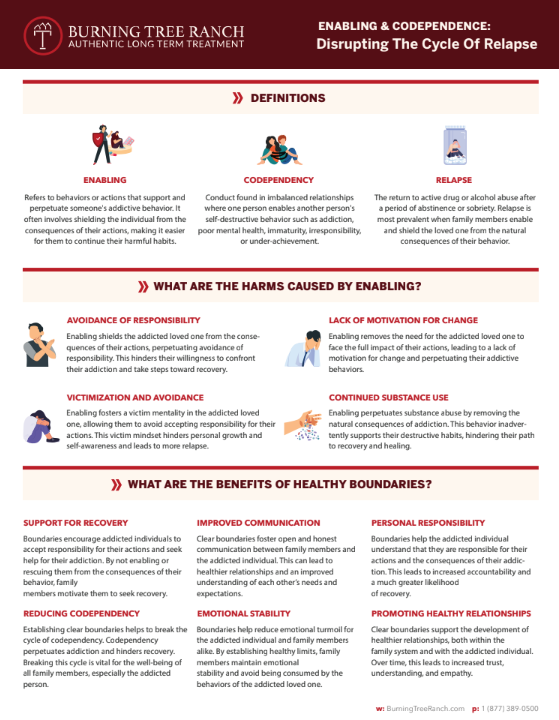Through my career and work with Burning Tree Programs, I’ve had the privilege of witnessing countless journeys of recovery and healing. Our program is committed to addressing the complex needs of individuals who find themselves caught in the cycle of relapse. Through this work, we’ve identified a critical factor that often influences the success or setback of a patient’s recovery journey: the role of family dynamics, specifically enabling and codependency.
Enabling behaviors and codependent relationships, though often stemming from a place of love and a desire to help, can inadvertently contribute to the relapse cycle. Understanding these dynamics is crucial for families wishing to support their loved ones effectively through recovery.

The Nature of Enabling
Enabling occurs when family members or close friends take actions that unintentionally protect the individual from the consequences of their behavior. This can range from covering up mistakes and providing financial support that is used towards sustaining the addiction to making excuses for their behavior. While these actions are typically motivated by a desire to shield the individual from harm, they can prevent the person from fully experiencing the consequences of their actions, thus delaying the realization that they need help.
The Cycle of Codependence
Codependence is a pattern of behavior where a family member or a friend excessively cares for a person’s needs, often neglecting their own in the process. This behavior can maintain the addiction by allowing the person with the addiction to continue their behavior without facing the full impact of their actions on their relationships and lives. Codependent relationships often involve a complex mix of emotions, including fear, guilt, and a sense of responsibility for the addicted individual’s well-being, which can be overwhelming and counterproductive to both parties’ health and recovery.
The Impact on Recovery
The dynamics of enabling and codependency can significantly influence an individual’s recovery trajectory. They can create a safety net that reduces the perceived need for change, perpetuating the cycle of addiction and relapse. Furthermore, these dynamics can also strain family relationships, leading to an environment that is not conducive to recovery.
Moving Forward
The path to supporting a loved one through recovery involves recognizing and addressing these enabling and codependent behaviors. Families can benefit greatly from education and support to learn healthier ways of supporting their loved ones. This might include setting boundaries, seeking therapy or support groups for themselves, and learning to focus on their own needs and well-being as much as they do on their loved one’s recovery.
As a treatment program, we emphasize the importance of family involvement in the recovery process. Through family therapy and educational programs, we aim to equip families with the understanding and tools they need to support their loved ones in a way that promotes lasting recovery. By addressing the patterns of enabling and codependence, families can become a powerful force in breaking the cycle of relapse.

The Dual Path of Recovery: Healing for Both Individuals and Families
Through countless conversations and shared stories, a common theme emerges about the most complicated aspects of breaking the cycle of enabling and codependent behaviors. These insights, offered by family members who have made significant progress in this area, illuminate the complex emotional landscape that families must traverse to support recovery effectively.
The Challenge of Letting Go
One of the most frequently cited challenges is the emotional toll of letting go. For many family members, stepping back and refraining from intervening in every crisis represents a monumental shift in behavior and mindset. They describe the process as a painful but necessary relinquishment of control, akin to watching a loved one navigate a tightrope without a safety net. This act of letting go is fraught with fear and uncertainty, compounded by the worry that their loved one might fall deeper into their addiction without their intervention.
The Guilt and Fear of Consequences
The struggle with guilt and fear over the potential consequences of not enabling is closely tied to the difficulty of letting go. Many families share that they feared their decision to stop covering up or rescuing their loved ones would lead to more severe consequences, possibly even fatal ones. The internal battle between knowing and enabling is harmful in the long run, and the immediate fear of tragic outcomes creates a profound dilemma, making the journey toward non-enabling behavior incredibly challenging.
Redefining Relationships and Boundaries
Families also highlight the challenge of redefining relationships and establishing healthy boundaries. For those entrenched in codependent dynamics, the process of setting limits and sticking to them can feel like an act of betrayal or abandonment. Family members recount the emotional labor required to change long-standing patterns of interaction, often facing resistance or backlash from the loved one in recovery. The process of boundary-setting is described as a delicate balance between showing care and not contributing to the cycle of addiction, necessitating continuous self-reflection and adjustment.
Facing Personal Pain and Recovery
An equally daunting challenge is the need for family members to confront their pain and embark on a personal journey of recovery. Many express that addressing their codependent behaviors forced them to face their vulnerabilities, fears, and unresolved issues. This introspection and personal growth work is often described as one of the process’s most demanding but rewarding aspects, leading to healthier family dynamics and individual well-being.
Building a Support Network
Finally, families often speak to the difficulty of finding and building a support network that understands the nuances of their situation. The isolation that can accompany the stigma of addiction makes it hard to reach out, share experiences, and seek support—finding communities, whether through support groups, therapy, or other families in similar situations, is cited as a critical but challenging step in the journey towards breaking the cycle of enabling and codependency.
A Community of Support: Navigating Recovery Together
The path toward supporting a loved one in recovery, free from enabling and codependent behaviors, is complex and fraught with emotional challenges. The courage and resilience required to navigate this path are immense, but the families who share their stories also speak to the profound growth and healing that can emerge from this journey.
As a treatment program, we remain committed to supporting families through this process, offering guidance, resources, and a community of support to navigate the intricate path of recovery together. The insights from these families serve as a beacon of hope and a reminder of the strength found in vulnerability and change.
Healing Together: Books For Family Members
The following books can serve as valuable tools for families navigating the challenges of enabling, codependency, and recovery.
- “Codependent No More” by Melody Beattie
- This classic book offers insights into the nature of codependency and practical steps to overcome these behaviors. It’s a must-read for anyone looking to understand and change patterns of codependency.
- This classic book offers insights into the nature of codependency and practical steps to overcome these behaviors. It’s a must-read for anyone looking to understand and change patterns of codependency.
- “Loving Someone in Recovery: The Answers You Need When Your Partner Is Recovering from Addiction” by Beverly Berg, MFT, PhD
- This guide helps readers navigate the challenges of being in a relationship with someone who is recovering from addiction. It provides strategies for communication, setting boundaries, and self-care.
- This guide helps readers navigate the challenges of being in a relationship with someone who is recovering from addiction. It provides strategies for communication, setting boundaries, and self-care.
- “Boundaries: When to Say Yes, How to Say No to Take Control of Your Life” by Dr. Henry Cloud and Dr. John Townsend
- Though not specifically about addiction, this book is invaluable for understanding how to set healthy boundaries, an essential skill for families dealing with recovery.
Until next time,
Brook





